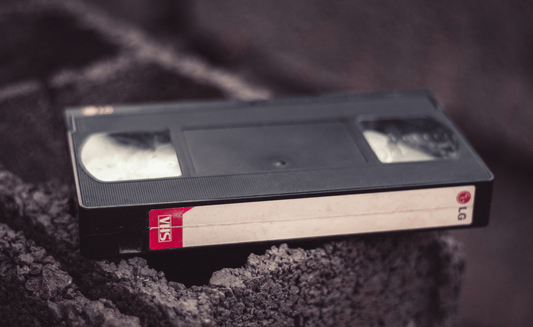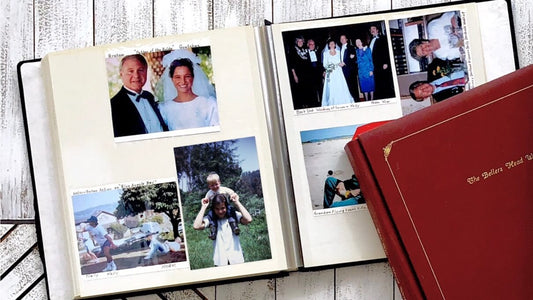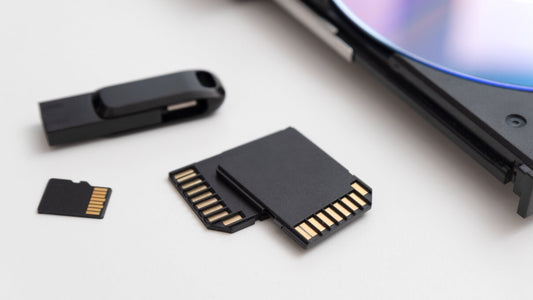Many families have boxes, closets, and shelves full of old VHS tapes that contain memories, movies, and home videos. Each tape contains over 1000 feet of tape reel, tons of plastic, and chemicals that could potentially harm the environment. That’s why it’s important to recycle VHS tapes to ensure they never end up in a landfill.
However, it’s important to digitize the precious memories first so that your home movies are preserved for future enjoyment. Capture has preserved memories for over 12 million families, and we can do the same for your VHS tapes. But we’re also committed to environmentally friendly practices, which is why we put together this comprehensive guide to recycling VHS tapes.
Keep reading to learn how to recycle VHS tapes including the reasons why it’s important to do so, where you can take them, and factors to consider before simply throwing them into the garbage.
Jump to:
-> How to Know When to Get Rid of VHS Tapes
-> Why Should You Recycle VHS Tapes?
-> Preserving Memories of VHS Tapes
How to Know When to Get Rid of VHS Tapes

VHS tapes were many families' go-to analog format for home movies, but they have inched toward obsolescence over the last 20 years. That doesn’t mean you have to get rid of them, but there are some reasons that it might be time to go completely digital.
First, VHS tapes simply take up a lot of space that could be used for something else. In many cases, they sit around gathering dust and can be a pain when it comes to decluttering. This is especially true if you rarely, or never, use a VCR and instead use digital formats, DVDs, cell phones, cloud storage, and streaming services.
In addition, VHS tapes degrade over time, which can compromise the content and contribute to discoloration, skips, lines, and other problems. Because of this, there is no reason to keep them until the data is completely lost.
Once you ensure your memories are safe and duplicated as high-quality digital versions, then you can start considering whether it’s time to get rid of them for good. That doesn’t mean you should throw them away. Instead, you can recycle VHS tapes, but there are some challenges to doing so.
Can VHS Tapes Be Recycled?

VHS tapes can definitely be recycled, but there are some challenges and obstacles that you may encounter when deciding how to recycle or reuse them. First, the outside casing of VHS tapes is made from polypropylene plastic, but the tape inside is made out of a different type of plastic. Because of this, the recycling programs may have to divide up the portions for efficient recycling.
Furthermore, the magnetic tape inside the VHS that stores the data isn’t usually recyclable and must be removed before the casing can be recycled properly. The Mylar tape is made from stretched polyethylene terephthalate. It may also be coated in other toxic chemicals like chromium, polyester urethane, and magnetic oxide that allow the tape to hold a magnetic signal and store your memories.
Generally, these chemicals aren’t toxic in small amounts, but when you and millions of other families want to recycle VHS tapes, it poses a concern for recycling services and the environment. Magnetic tape and cassette casing can also collect mold and mildew that could pose a health or safety hazard to employees at recycling centers.
Because of these challenges, it can be hard to find “where to recycle VHS tapes near me” because many municipal recycling programs simply don’t have the resources to do so effectively. However, there are other options including dedicated electronics recycling facilities that accept VHS tapes or choosing to reuse, repurpose, or donate the old VHS tapes instead.
Why Should You Recycle VHS Tapes?


Whether you have old Disney videotapes or priceless home videos, it’s important to recycle VHS tapes when you get rid of them. Each standard VHS videotape contains 1,410 feet of Mylar tape that contains potentially toxic metals that can damage the environment if it ends up in a landfill.
Additionally, all of the plastic contained in VHS tapes is harmful to the environment because it can take up to 100 years before decomposing. Then, it breaks down into microplastics that endanger soil, water supply, and healthy habitats. In fact, 8 million tons of plastic find its way into the ocean and kill 100,000 marine mammals and turtles and 1 million sea birds each year
By recycling VHS tapes as well as audio cassette tapes, Betamax tapes, and even laptops and other e-waste, you can do your part to ensure less plastic waste damages the Earth we call home. It will help to reduce waste and greenhouse gasses, promote sustainability, and limit the amount of household hazardous waste that ends up in landfills.
How to Recycle VHS Tapes

To recycle VHS tapes, you can’t simply put them in plastic bags or into your recycling bin. Instead, you will have to use recycling companies that specifically accept old electronics including analog videotapes. You may have local options in your area that recycle old electronics, but there are also nationwide recycling services that you can use.
For example, GreenDisk offers Technotrash cans that you can fill up with videotapes, ink cartridges, disks, pagers, cell phones, and more. However, while they are convenient and easy to use, they do charge for their recycling services. Some Best Buy stores also offer curbside recycling collection for electronics, including VHS tapes. Finally, check out TerraCycle to see if there is a recycling drop-off in your area.
If these aren’t an option, then you can also consider donating your old tapes to libraries, museums, thrift stores, the Salvation Army, or Goodwill. You may also consider reusing them for teaching, art projects, or even selling them on Craigslist, Amazon, or the Facebook Marketplace.
Additionally, there are sellers on places like eBay or Etsy that make unique products out of old VHS tapes like gifts, purses, keychains, lampshades, and more who may be interested in buying your old VHS tapes. You may also check FreeCycle, a non-profit that allows you to give away stuff to people in one of over 5000 participating towns including major cities like New York City or Chicago as well as smaller municipalities across the U.S.
How to Prepare VHS for Recycling
While dedicated electronics recycling companies will have their own instructions to follow when sending them your VHS tapes, there are some additional considerations. If you are using a standard recycling center, make sure you ask if they can accept just the cassette casing. Then, you will have to remove the Mylar tape yourself before donating the plastic.
In addition, since VHS tapes often contain personal information that you may want to keep private, we recommend that you erase the data before disposing of the magnetic tape. You can do this with a degausser machine that utilizes powerful magnetic fields to erase the content.
Just make sure that you preserve the home movie footage before erasing it!
Preserving Memories of VHS Tapes

There are a few options when it comes to preserving the memories contained in your old tapes by transferring them into digital formats that are designed to last forever. DIY options include a digital converter machine, but this is time-consuming and will require a VCR, camcorder, or some other way to play the VHS tapes during transfer.
Another option is to turn VHS tapes into DVDs with a combo DVD and VCR recorder. This is also time-consuming, but won’t require any additional software or devices to create durable DVD copies of your analog memories.
Finally, you can choose Capture, a professional digitization service that creates downloadable high-quality digital copies of your memories. Plus, we offer USB flash drive or DVD options as well. The best part is that your VHS tapes will be safe the entire time because we spent millions on a state-of-the-art security and tracking system that follows your memories through every hand and back to your doorstep.
Conclusion

Analog videotapes contain plastic, magnetic tape, and potentially harmful chemicals that can harm the environment. That’s why it’s important to recycle VHS tapes to reduce waste and promote sustainable practices. However, you will have to find an e-waste recycling service that accepts VHS tapes locally or online with services like GreenDisk. Alternatively, you can donate them, sell them, reuse them, or give them away.
Whatever you decide to do with your old VHS tapes, make sure that you preserve your memories first. Not only does it save you space, but it also makes it much easier to share home movies over social media or email and preserves them as digital copies for future generations to enjoy. Click here to learn about Capture’s satisfaction-guaranteed videotape transfer services!










